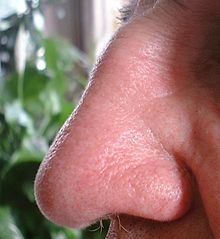Noses
organ that smells and facilitates breathing
(Redirected from Nose)
Noses are an organ on the face, and in particular a protuberance in vertebrates that houses the nostrils, which admit and expel air for respiration in conjunction with the mouth, and also house receptors for detecting smells. In humans, the nose is located centrally on the face; on most other mammals, it is on the upper tip of the snout.

Quotes
edit- As clear and as manifest as the nose in a man's face.
- Robert Burton, The Anatomy of Melancholy (1621), Part III, Section III. Memb. 4. Subsec. I.
- Se couper le nez pour faire dépit à son visage.
- Cut off your nose to spite your face.
- Tallement des Réaux, Historiettes, Volume I, Chapter I. (About 1657–1659); reported as a proverb in Hoyt's New Cyclopedia Of Practical Quotations (1922), p. 639.
- François Rabelais' Gargantua and Pantagruel, Laurence Sterne's Tristram Shandy, Edmond Rostand's Cyrano de Bergerac, Nikolai Gogol's Nos and, of course, fairy tales such as Carlo Collodi's Pinocchio and Wilhelm Hauff's Zwerg Nase are only some of the texts that feature prominent noses.
- Ralf Hertel (2005). Making Sense: Sense Perception in the British Novel of the 1980s and 1990s. Rodopi. p. 116. ISBN 90-420-1864-X.
- When any one of you awakes from sleep . . . he must clean his nose three times, for the devil spends the night in the interior of one’s nose.
- Sahih Muslim. (462). Quoted from Ram Swarup, Understanding Islam through Hadis, 1983. [1]
Hoyt's New Cyclopedia Of Practical Quotations
edit- Quotes reported in Hoyt's New Cyclopedia Of Practical Quotations (1922), p. 561.
- Jolly nose! there are fools who say drink hurts the sight,
Such dullards know nothing about it;
'Tis better with wine to extinguish the light
Than live always in darkness without it.- Paraphrase of Olivier Basselin's Vaux-devire. Quoted by Ainsworth in Jack Sheppard, Volume I, p. 213.
- Give me a man with a good allowance of nose,… when I want any good head-work done I choose a man—provided his education has been suitable—with a long nose.
- Napoleon, Related in Notes on Noses, p. 43. (Ed. 1847).
- Plain as a nose in a man's face.
- François Rabelais, Works. The Author's Prologue to the Fifth Book.